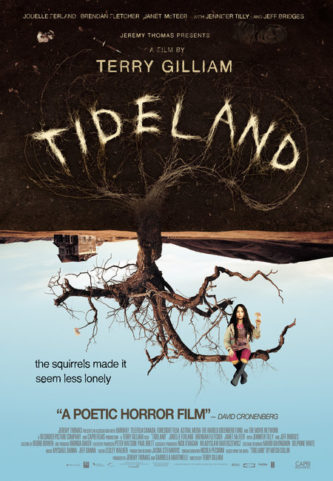 A Terry Gilliam feature that showcases this vital talent at his free-wheeling best. If you ask me it’s exactly what we need right now: a demanding yet enchanting, freaky as hell surreal-fest that promises to shock, bewilder and ultimately delight—though just as likely annoy—potential viewers.
A Terry Gilliam feature that showcases this vital talent at his free-wheeling best. If you ask me it’s exactly what we need right now: a demanding yet enchanting, freaky as hell surreal-fest that promises to shock, bewilder and ultimately delight—though just as likely annoy—potential viewers.
TIDELAND was based on a 2000 novel by Mitch Cullin, a short and strange little book about a young Southern girl’s private world, packed with junkie parents, talking Barbie doll heads, a deranged taxidermist and several dead bodies. Cullin sent a pre-publication copy of the book to Terry Gilliam, who was understandably taken with it. After a seven-year interval following 1998’s FEAR AND LOATHING IN LAS VEGAS (during which Gilliam attempted to make another feature but failed spectacularly—see the 2002 documentary LOST IN LA MANCHA) Gilliam’s film adaptation was shot back-to-back with the more straightforward BROTHERS GRIMM.
The pairing seems curiously appropriate, as the Weinstein brothers-backed THE BROTHERS GRIMM is the director’s most crassly commercial movie by far, while the European-Canadian co-production TIDELAND, produced by the esteemed Jeremy Thomas, is definitely Gilliam’s least audience-friendly effort to date. In any event, it finally reached US screens in October of ’06 (whereas THE BROTHERS GRIMM was released a full year earlier), with a February ’07 DVD release that includes a making-of doc by CUBE director Vincenzo Natali.
10-year-old Jeliza-Rose (Jodelle Ferland) lives in the Deep South with her junkie parents. One day her mom dies unexpectedly and Jeliza’s father (Jeff Bridges) reacts by impulsively moving them to her grandmother’s house. Said house turns out to be a forbidding and deserted structure (its owner having died long ago) set in the middle of a vast field. This doesn’t stop Jeliza and her father from making themselves at home in this ramshackle establishment; the old man takes refuge in his heroin addiction while Jeliza escapes into a private world of talking Barbie doll heads, mischievous squirrels and friendly fireflies. There’s also a witchy woman who lives nearby with her deranged brother Dickens, an epileptic who underwent curative surgery and ended up permanently brain-damaged as a result. These two characters are very much real, although they fit right into Jeliza’s fantasy world.
That world grows more all-encompassing when Jeliza’s father dies one morning in much the same way her mother did. Jeliza is thus stuck with a rotting corpse she doesn’t know what to do with; luckily the witchy neighbor does, using her penchant for taxidermy to spiff up the old man’s carcass. The woman, it transpires, has a history with Jeliza’s family, having been assisted by Jeliza’s grandmother years ago and now eager to return the favor. Thus she, together with her brother, Jeliza and her father’s stuffed corpse, creates a makeshift family…but any family this dysfunctional is bound to come apart at the seams, and that’s exactly what transpires.
TIDELAND was the a rare Terry Gilliam project to have been made entirely outside the Hollywood system, and so was free of the executive meddling that has dogged Gilliam throughout his career. The result is a volcanic flood of weirdness, a deeply Gilliamesque celebration of childlike (even childish) irrationality and subversion.
The cast, which includes Gilliam semi-regular Jeff Bridges and an unrecognizable Jennifer Tilly, is uniformly solid, with the young Jodelle Ferland (from SILENT HILL) doing superlative work in the lead role: she’s quite pretty, radiating a sunny aura reminiscent of kid-movie icons like Dorothy and Alice, but with a dark edge that fits Gilliam’s penchant for children’s fairy tales mixed with adult malice and grotesquerie (best realized in the immortal TIME BANDITS). TIDELAND certainly feels true to a child’s imagination, and could almost be a children’s film but for the way it so proudly flaunts its R-rating.
Gilliam has never had much patience for traditional storytelling, and here dispenses with it altogether in an intentionally rambling, disjointed narrative. The visuals fully support this aesthetic, with incredibly oblique angles, a constantly moving camera and nearly every scene shot through fish-eye lenses. How Gilliam makes this all work is part of his inscrutable genius; any other filmmaker would doubtless end up with an indecipherable mess, but Gilliam, as in all his best films, emerges with a darkly poetic and frequently brilliant concoction.
Of course, genius or not, Gilliam’s undisciplined approach has its drawbacks. Occasionally he loses control of the material in scenes that seem part of a different movie entirely (i.e. a “where-the-Hell-did-that-come-from???” doll brain transplant), while the film overall, which runs a full two hours, is easily ten to fifteen minutes too long. Worst of all is the fact that, simply, its potential audience is limited at best. I consider TIDELAND one of Gilliam’s most interesting films, but it’s a definite love-it-or-hate concoction—I loved it, in other words, but you might not.
Vital Statistics
TIDELAND
Capri Films/Recorded Picture Company
Director: Terry Gilliam
Producers: Jeremy Thomas, Gabriella Martinelli
Screenplay: Terry Gilliam, Tony Grisoni
(Based on a novel by Mitch Cullin)
Cinematography: Nicola Pecorini
Editing: Lesley Walker
Cast: Jodelle Ferland, Jeff Bridges, Jennifer Tilly, Brendan Fletcher, Dylan Taylor, Wendy Anderson, Sally Crooks, Alden Adair, Harry Gilliam, Amy Matysio, Kent Wolkowski
